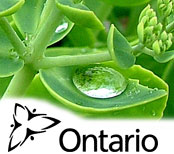
News |
- Hewlett Packard Introduces Eco-Technology
- Canadians Support Carbon Tax: Poll
- Rainforest Activist Resigns as Brazil's Environment Minister
- Don Cardinal - Passing of an Aboriginal Leader
- Cree Lands Claim Before Conawapa
- Canadian Magazine Makes Pulp History
- Beaufort Sea Drilling Adds Risk for Polar Bears
- Ontario Bans Cosmetic Pesticides
- Two Degree Campaign
- Opposition to US and EU Biofuels Growing
- UN Investigates Canada's GHG Reporting
- Ontario Unwilling to Stop Exploration
| Hewlett Packard Introduces Eco-Technology | 03 June 08 |
 A new suite of products, programs and technologies called "Eco Highlights" from Hewlett Packard provides environmentally friendly choices for customers. Recycled materials, energy savings and paper reduction are key goals of these new products. A new suite of products, programs and technologies called "Eco Highlights" from Hewlett Packard provides environmentally friendly choices for customers. Recycled materials, energy savings and paper reduction are key goals of these new products. HP's carbon footprint calculator estimates energy use of existing or older printers and compares them with newer energy efficient products. HP plans to increase the energy efficiency of its printers by 40 percent before 2011 and has introduced desktop PCs with built in power management tools. HP was featured in the Environmental Defense Fund Innovations Review 2008 for its teleconference technologies ability to reduce the carbon footprint of costly business travel. View May 23, 2008 GreenBiz article Visit HP Eco Solutions website View May 22, 2008 Information Week article View May 23, 2008 ENN article View May 20, 2008 Media Wire article Sources: GreenBiz, HP, Information Week, ENN, Media Wire |
|
 Print version Print version |
Top |
| Canadians Support Carbon Tax: Poll | 29 May 08 |
 There is growing support among Canadians for an environmental tax on activities that generate carbon emissions, according to a new poll commissioned by the Pembina Institute. There is growing support among Canadians for an environmental tax on activities that generate carbon emissions, according to a new poll commissioned by the Pembina Institute.Both British Columbia and Quebec have already introduced carbon taxes. The poll results indicate over 70 per cent of Canadians consider British Columbia's recent introduction of a carbon tax "a positive step". The poll also revealed Canadians would like to see new revenues invested in improving energy efficiency and clean energy technologies. A carbon tax could be introduced alongside regulations for a cap and trade system for large industries. Both help to put a price on pollution. The combined approach could speed up Canada's transition to a low carbon economy and support reduction of greenhouse gas emissions. Tim Weis, Senior Technical and Policy Advisor at Pembina said, "Using a carbon tax to foster renewable energy would be an effective way to create Canadian jobs in a booming global industry while cleaning up our energy supply." View May 25, 2008 CanWest News article View May 25, 2008 CTV article View May 26, 2008 Pembina Institute press release View Pembina Institute Backgrounder and McAllister Opinion Research polling results (PDF) Sources: Pembina Institute, CanWest News, Manitoba Wildlands |
|
 Print version Print version |
Top |
| Rainforest Activist Resigns as Brazil's Environment Minister | 29 May 08 |
 Carlos Minc, founder of the Green Party in Brazil and Rio de Janeiro state's environment secretary was quickly named the new environment minister after Marina Silva's recent surprising resignation. Environmental activists hope Mr. Minc, a professor of geography and winner of a United Nations prize in 1989 for his green campaigns, is able to protect the rainforest at a time when the Brazilian government is pursuing an ambitious economic agenda. Carlos Minc, founder of the Green Party in Brazil and Rio de Janeiro state's environment secretary was quickly named the new environment minister after Marina Silva's recent surprising resignation. Environmental activists hope Mr. Minc, a professor of geography and winner of a United Nations prize in 1989 for his green campaigns, is able to protect the rainforest at a time when the Brazilian government is pursuing an ambitious economic agenda. Former minister, Marina Silva led Brazil, initiated an ambitious effort to protect the Amazon rainforest. Often at odds with other cabinet members, she was seen as an obstacle to the country's development plans. Silva is a Goldman prize winner for her efforts to save the Amazon - her home - and an elected politician since l994 in Brazil. "Brazil is loosing the only voice in the government that spoke out for the environment," said Sergio Leitao, director of public policy for Greenpeace in Brazil, at the time of her resignation. Silva was appointed by President Luiz Inacio da Silva in 2002. During her five year tenure, she made tough rules for companies and strengthened laws for logging and farming in the Amazon. Despite her dedicated efforts, she was unsuccessful in opposing several infrastructure projects in the rainforest including two hydroelectric dams on the River Madeira and a major new road. View May 27, 2008 BBC News article View May 14, 2008 PlanetArk article View May 13, 2008 Associated Press article View May 14, 2008 All Headline News article View Goldman Prize for South & Central America 1996 Sources: BBC News, Planet Ark, AP, AHN |
|
 Print version Print version |
Top |
| Don Cardinal - Passing of an Aboriginal Leader | 27 May 08 |
 Don A. Cardinal, well-known Aboriginal political activist, passed away in Winnipeg May 20, 2008 at the age of 71 years. As a Cree Elder he was known for his devotion to revitalizing aboriginal culture in Canada. Don A. Cardinal, well-known Aboriginal political activist, passed away in Winnipeg May 20, 2008 at the age of 71 years. As a Cree Elder he was known for his devotion to revitalizing aboriginal culture in Canada.Cardinal was also known for his opposition to past Prime Minister Pierre Trudeau's legendary White Paper of 1969 that aimed to extinguish treaty rights. Together with his brother Harold Cardinal they wrote the Red Paper response, which lead the political fight to protect treaty rights in Canada. Cardinal was a teacher of Aboriginal history and philosophy to all Canadians. As a healer he enjoyed working with traditional medicines and ceremonies. Cardinal was a member of Sucker Creek Cree First Nation in Northern Alberta and settled in Manitoba at Seven Sisters Falls. Cardinal was survived by his wife Allison,10 children, 14 grandchildren and one great-grandchild. He advised Aboriginal communities across the continent, regarding heritage sites. Manitoba Culture and Heritage Minister Eric Robinson, himself Cree, said "His greatest legacy is the kindness he showed other people and that's a legacy that will live on... and his traditional teachings will live on. We can take comfort in that." Caroline Bruyere, of Sagkeeng First Nation, remembers Don Cardinal's knowledge about Silver Falls, on the Winnipeg River, "He confirmed for us how important the site was to our people. He helped us save Silver Falls from a cottage development. I will always thank him for his help." View May 23, 2008 Passages Obituary View May 22, 2008 Winnipeg Free Press Obituary Sources: Winnipeg Free Press (photo), Passages |
|
 Print version Print version |
Top |
| Cree Lands Claim Before Conawapa | 27 May 08 |
 Fox Lake Cree Nation in northern Manitoba continues to face the impact of three major hydro dams on the Nelson River. Fox Lake Cree Nation in northern Manitoba continues to face the impact of three major hydro dams on the Nelson River. The Conawapa Hydro project would be the fourth dam built in Fox Lake's traditional territory. Fox Lake Cree Nation is calling on Ottawa to acknowledge devastating impacts of the previous Kettle, Long Spruce and Limestone dams and resolve the federal government's failure to provide a Reserve in their traditional territory. "Conawapa will not occur until the federal government comes to the table," said Culture and Heritage Minister Eric Robinson, who has written to federal Indian Affairs Minister Chuck Strahl to demand a settlement. AFN National Chief Phil Fontaine also stated his support for Fox Lake Cree Nation. Members of Fox Lake Cree Nation live mostly in Gillam and on several land parcels nearby. The government has a treaty land entitlement waiting ratification by the band that would give Fox Lake 26,000 acres in reserve lands. View May 8, 2008 Winnipeg Free Press article View May 16, 2008 Fox Lake Cree Nation response View May 7, 2008 Fox Lake Cree Nation news release Sources: Winnipeg Free Press, Fox Lake Cree Nation, Turtle Island |
|
 Print version Print version |
Top |
| Canadian Magazine Makes Pulp History | 23 May 08 |
 Canadian Geographic magazine made history May 22nd. Its annual environment issue is the first magazine in North America to be printed on paper made with wheat straw waste. Canadian Geographic magazine made history May 22nd. Its annual environment issue is the first magazine in North America to be printed on paper made with wheat straw waste.Scientists at the Alberta Research Council have been researching the development of wheat sheet for 10 years. It's made from 20 percent wheat straw, 40 percent recycled paper, and 40 percent wood pulp. Markets Initiative (a Canadian environmental group), Canadian Geographic, the Alberta Research Council and the magazine's printer, Dollco Printing planned the special issue together. Adding agricultural waste to pulp from trees could offer farmers a new source of revenue. It could also reduce demand for pulp from the continent's boreal forests and temperate rainforests. Straw from Canada's wheat harvest could produce 8 millions of tonnes of pulp - equivalent to paper volume used by North American newspaper industry every year. That is a saving of 100 million trees each year. The processing of wheat into pulp is less energy intensive and has about half the ecological footprint than wood processing. View May 22, 2008 Markets Initiative, Canadian Geographic magazine, Dollco Printing and Alberta Research Council press release View May 22, 2008 Globe and Mail article View May 21, 2008 CBC article Sources: CBC, Globe and Mail, Markets Initiative, Canadian Geographic magazine, Dollco Printing, Alberta Research Council |
|
 Print version Print version |
Top |
| Beaufort Sea Drilling Adds Risk for Polar Bears | 23 May 08 |
 The ecologically sensitive Beaufort Sea /Mackenzie Valley Delta of Canada's Arctic will be opened to oil and gas drilling with bidding for five permits closing June 2, 2008. Canada has yet to issue a plan to protect polar bear populations who inhabit the area, from devastating effects of petroleum exploration and climate change. The ecologically sensitive Beaufort Sea /Mackenzie Valley Delta of Canada's Arctic will be opened to oil and gas drilling with bidding for five permits closing June 2, 2008. Canada has yet to issue a plan to protect polar bear populations who inhabit the area, from devastating effects of petroleum exploration and climate change. Climate change, melting sea ice, increased human activity, and over hunting in northern stretches of Canada place Canada's polar bear populations at risk of extinction. WWF-Canada is calling on Prime Minister Stephen Harper for an immediate and "aggressive plan" to protect polar bears and reduce greenhouse gas emissions. The Committee on the Status of Endangered Wildlife in Canada (COSEWIC) met in Yellowknife, NWT in April 2008 to discuss the uncertainty of the polar bear's future, resulting in reassessment as being of "Special Concern". "Research is showing numbers of Beaufort Sea polar bears starving and walking all the way to Russia, or far inland, in search of food," said Peter Ewins of WWF-Canada. Further offshore development of fossil fuels is expected in the Arctic. A WWF report, Arctic Climate Impact Science - An update since ACIA identifies change occurring in all arctic systems due to global warming. Exploration and extraction of petroleum resources increase the risk to polar bears and limit already stressed habitat. View April 24, 2008 WWF article View report, Polar Bear and other Species at Risk by Independent Canadian Science Body (PDF) View WWF Oil Activity in the North webpage View April 20, 2008 AFP article View April 20, 2008 WWF Canada article View February 9, 2008 Canada Gazette Vol. 142, No. 6 Sources: WWF, COSEWIC, Canadian Gazette |
|
 Print version Print version |
Top |
| Ontario Bans Cosmetic Pesticides | 23 May 08 |
 Large retailers of lawn and garden supplies are responding to the Ontario-wide ban on the sale and cosmetic use of pesticides. The draft list of banned pesticides contains more than 300 products. Large retailers of lawn and garden supplies are responding to the Ontario-wide ban on the sale and cosmetic use of pesticides. The draft list of banned pesticides contains more than 300 products.Premier Dalton McGuinty said he is determined to bring in a "single, solid, safe and effective" province standard to Ontario, coming into affect spring 2009. Exceptions for use of pesticides would be made for golf courses, farms and forests. "Many municipalities have already shown leadership in banning or restricting cosmetic-use pesticides. We're extending that protection to all families wherever they live," said Environment Minister John Gerretsen. Canadian Tire, the largest retailer of lawn and garden products in the country, is already expanding their eco-friendly lawn care products. Home Depot and Walmart Canada have committed to stop selling "traditional" pesticides and herbicides by the end of 2008. Over 44 percent of Ontarians live in a municipality where the cosmetic use of pesticides is already banned, many with stronger protections than the provincial legislation proposes. Quebec is the only other province in Canada to have a similar ban on pesticide use. View April 22, 2008 Ontario government press release View April 22, 2008 Ontario government backgrounder View April 23, 2008 PlanetArk article View April 23, 2008 Calgary Herald article Visit Pesticide Free Ontario Sources: Government of Ontario, Canadian Press, PlanetArk, CBC, Calgary Herald |
|
 Print version Print version |
Top |
| Two Degree Campaign | 14 May 08 |
 Environmental groups applaud the role Canadian provinces and territories are taking to fight climate change - while the Government of Canada has yet to state officially what it considers to be an acceptable limit for temperature increase. Environmental groups applaud the role Canadian provinces and territories are taking to fight climate change - while the Government of Canada has yet to state officially what it considers to be an acceptable limit for temperature increase.The Climate Action Network Canada-Réseau action climat Canada is seeking to keep global average warming to less than 2 degrees celsius relative to pre-industrial levels. A letter has gone to each government leader across Canada seeking support for this science based goal of limiting warming to two degrees Celsius. The world has warmed by 0.74 degrees Celsius over the past century, and the rate of warming is expected to increase over coming decades, as noted in a memorandum prepared by Environment Canada in 2007. All regions of Canada are warming more than the global average. Canada faces risk of floods, heat waves, droughts, water scarcity, rising sea levels, ecosystem stress, and other serious impacts. Gaile Whelan Enns, Manitoba Wildlands director said, "We have asked Premier Doer to state his support for limiting global warming to two degrees. We expect to receive his confirmation soon." The European Union and many small island states, have adopted the policy of keeping global average warming to below 2 degrees celsius. Quebec is the first province in Canada to support this goal. View Climate Action Network press releases View May 5, 2008 Climate Action Network Letter to Manitoba Premier Doer (PDF) View April 2, 2008 CNW press release View March 25, 2008 Greenpeace press release Sources: Climate Action Network, CNW, Greenpeace |
|
 Print version Print version |
Top |
| Opposition to US and EU Biofuels Growing | 14 May 08 |
 Efforts to expand biofuel production in the United States and European Union are facing strong opposition from environmental groups and world organizations saying they are morally and economically irresponsible. Efforts to expand biofuel production in the United States and European Union are facing strong opposition from environmental groups and world organizations saying they are morally and economically irresponsible.Economist and special advisor to the United Nations, Jeffrey Sachs warned the US and EU to stop transitioning agriculture land to grow biofuels, derived from cereals, soybean, rapeseed oil, and sugar cane due to rising food prices and the current threat of global food scarcity. The Earth Policy Institute (EPI) says the United States burned 25 percent of its corn supply as fuel last year. Europe currently plans to replace 10 percent of diesel and gasoline consumption with biofuels by 2020. Friends of the Earth International have an ongoing campaign against development, production and trade of biofuels with concerns the politically driven demand will increase already serious social and environmental problems. "Agrofuels are not part of the solution to climate change, they are part of the problem. Agrofuel production often takes over land used for food production, and agrofuel plantations displace entire peasant and indigenous communities," said Friends of the Earth International campaigner Longgena Ginting. View May 8, 2008 Time article View May 5, 2008 Google News article View Friends of the Earth - Declaration on agrofuels View May 5, 2008 Friends of the Earth article View May 8, 2008 Google News article Sources: Time, Google News, Friends of the Earth |
|
 Print version Print version |
Top |
| UN Investigates Canada's GHG Reporting | 13 May 08 |
 A UN investigation could find Canada in violation of Kyoto Protocol rules. Environmental groups say this shows the federal government doesn't take its international commitments seriously. A UN investigation could find Canada in violation of Kyoto Protocol rules. Environmental groups say this shows the federal government doesn't take its international commitments seriously. On May 5, 2008 Canada was officially notified of the decision to investigate the alleged violation of Kyoto reporting requirements. As a signatory to the United Nations Framework Convention on Climate Change (UNFCC), Canada must keep a national registry and annually report greenhouse gas (GHG) emissions and removals. "What's really the point here is that this government doesn't think it's important to play by the international rules," says John Bennett, executive director of Climate for Change. Canada was warned last month of an investigation after missing a Jan 1, 2008 reporting deadline. Environment Canada's failure to submit the national inventory registry indicates non-compliance of emission targets. The UN Kyoto compliance committee will consider Canada's case at a hearing in late May or mid-June. The Kyoto Protocol requires its 37 signatories to cut emissions by 5 percent below 1990 levels by 2008-2012. Canada said the targets were unattainable and committed to cut emissions by 20 percent below 2006 levels by 2020 with no intention to trade carbon credits with other countries. The inventory provides analysis of emission trends since 1990, including by jurisdiction within Canada, and monitors six greenhouse gasses. The United Nations publishes all national inventory reports on its website. The National Inventory Report, 1990-2005: Greenhouse Gas Sources and Sinks in Canada, April 2007 was the most recent report submitted by Canada. View May 7, 2008 Canadian Press article View May 7, 2008 Guardian article View May 7, 2008 CBC article View UNFCCC - Informal note on compliance procedure with Canada (PDF) View UNFCCC National Inventory Submissions 2008 View April 11, 2008 UN Report of the Review of the Initial Report of Canada (PDF) Sources: Canadian Press, Guardian UK, CBC, UNFCCC, Government of Canada, UN |
|
 Print version Print version |
Top |
| Ontario Unwilling to Stop Exploration | 13 May 08 |
 A network of First Nation and environmental organizations supported by a twenty prominent Canadians including Stephen Lewis, Margaret Atwood, and Sarah Harmer are calling on Premier Dalton McGuinty to put a stop to mineral exploration in traditional lands of two Ontario Aboriginal communities, and revise the Mining Act. A network of First Nation and environmental organizations supported by a twenty prominent Canadians including Stephen Lewis, Margaret Atwood, and Sarah Harmer are calling on Premier Dalton McGuinty to put a stop to mineral exploration in traditional lands of two Ontario Aboriginal communities, and revise the Mining Act.Bob Lovelace and six KI members have been imprisoned for protesting against mineral exploration within their traditional lands of Ardoch Algonquin First Nation and Kitchenuhmaykoosib Inninuwug (KI). The Assembly of First Nations warns there will be similar conflict all over the north unless the Ontario Mining Act includes consultation and revenue sharing with Aboriginal peoples. "Ontario's mining legislation is over 100 years old and doesn't fit with modern society's understanding of ecosystems, climate change and human rights," says Anna Baggio, Director, Conservation Land Use Planning of CPAWS Wildlands League. KI made a recent joint statement at the 7th Session of the UN Permanent Forum on Indigenous Issues that "with regard to climate change and biodiversity, it is essential that as Indigenous Peoples we have security and protection when we work to protect our land, air and water." View May 22, 2008 Robert Kennedy Jr., NRDC letter to Ontario Premier McGuinty (PDF) View April 22, 2008 - Chorus of celebrities call for release of Bob Lovelace and the KI Six (PDF) View Kitchenuhmaykoosib Inninuwug Joint Statement to UN Permanent Forum on Indigenous Issues View April 24, 2008 CBC article View April 24, 2008 Canadian Press article Sources: Wildlands League, Keewaytinook Okimakanak News, CBC, Canadian Press |
|
 Print version Print version |
Top |


 RSS Feeds:
RSS Feeds: